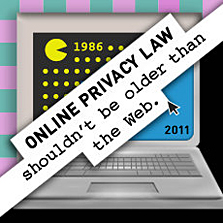
This week, our federal online privacy law turns 25. The ACLU is hosting a blog series that will address some of the many reasons why the "Electronic Communications Privacy Act of 1986" (ECPA) is in need of an upgrade! Spread the word using #UpdateECPA, and to learn more about your dotRights, visit www.aclu.org/ecpa.
Congress hasn't updated our basic electronic privacy law since 1986, long before most Americans sent their first email. So it's no surprise that our privacy protections haven't kept pace with new technological advancements. The current law even allows the government to read virtually all of our emails without a warrant. This extraordinary power is an egregious violation of the privacy Americans rightly expect.
Why should a warrant be required? Because email is deeply personal and private. It is an unfiltered view of our thoughts and a catalog of our relationships stretching back for years. Government agents should not be allowed to troll through all of our most private correspondence without proving to a judge that they have probable cause to believe that a search will turn up evidence of a crime.
All of us, whether Democrat or Republican, rich or poor, celebrity or unknown, protect our email accounts with passwords for a reason. We all recognize that email is rightly considered private.
What do Sarah Palin and Scarlett Johansson have in common? They have both had their email accounts hacked and their personal correspondence spread around the Internet. And they have both expressed how painful it was to have their private messages revealed to all the world.
Sarah Palin's email was hacked during the 2008 presidential campaign. Looking back in her recent memoir, she wrote "I was horrified to realize that millions of people could read my personal messages, including the thoughts of a friend who had written of her heartbreak over her pending divorce."
This year, Scarlett Johansson also became a victim of email hacking, and was helpless to stop her most revealing and private information, including nude photographs, from spreading like wildfire across the Internet. "No matter what the context," Johansson said in a CNN interview about the hacking, "when [your privacy] is sieged in some way it feels unjust, it feels wrong."
In both cases, the government prosecuted those responsible for these egregious violations of privacy. The U.S. Attorney leading the recent Hollywood cases, André Birotte, Jr., recognized the "financial and emotional costs of having someone intrude on your private life," and called such privacy invaders "scum."
Yet the same federal government that prosecuted the Palin and Johansson hackers wants easy access to your email for itself. Email isn't any less private because the person who wants to read it is a local police officer or an FBI agent rather than a hacker. It is time for Congress to update our electronic privacy laws and ensure that the government won't read any of our mail without getting a warrant based on probable cause.
Learn more about dotRights: Sign up for breaking news alerts, follow us on Twitter, and like us on Facebook.

